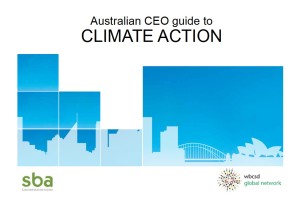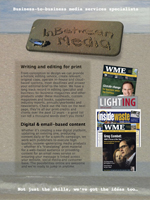 A growing number of Australia’s largest companies are taking a strategic position on climate change. Recognising not only the risks to be managed, there is increasing interest in the opportunities for business growth: with potential new products, services and markets opening up as the world’s major economies pursue their targets to decarbonise.
A growing number of Australia’s largest companies are taking a strategic position on climate change. Recognising not only the risks to be managed, there is increasing interest in the opportunities for business growth: with potential new products, services and markets opening up as the world’s major economies pursue their targets to decarbonise.
To support this trend, SBA has released the Australian CEO Guide to Climate Action with advice on how to integrate climate action initiatives into business strategy. The guide recommends strategies that drive energy productivity, increase the sourcing of renewable energy, reduce carbon throughout supply chains, improve water management, and support healthy ecosystems and sustainable lifestyles.
Sustainable Business Australia’s CEO Andrew Petersen says, “A substantial shift is taking place. Business focus on climate change is settling into core business strategy and out of the CSR function”.
Dr Peter Holt, head of strategy at carbon and energy management consultancy, Energetics, advises Australia’s largest greenhouse emitters. “We are seeing more businesses engaged in assessing their climate change risk positions.
“Across all sectors of the Australian economy we see businesses that are very active: setting and renewing emissions reduction targets, establishing an internal carbon price for assessing capital projects and using scenario-based analysis to assess emerging market opportunities and test the risks.”
Petersen adds, “There is widespread optimism in the global business community that the COP 21 climate negotiations in Paris will be successful. Much has already been achieved with participating nations announcing their domestic emissions reduction commitments ahead of the December meeting.
“Businesses that integrate climate change considerations into their business strategy early will be well positioned ahead of increased global action on climate change.”
Dr Holt cites the example of energy productivity as a measure that creates new business value and delivers emissions reductions “With a focus on improving the way energy is used, companies can realise multiple benefits from energy cost savings, increased outputs and improvements in product quality and reliability, and reduced maintenance and labour costs. There are clear commercial advantages while driving emissions reductions.”
Companies seeking leadership on climate change include SBA member AGL which, together with Origin Energy and Westpac Bank, has joined more than 350 organisations worldwide as signatories to the ‘We Mean Business’ coalition. This campaign requires commitment to a series of strategic initiatives to reduce greenhouse emissions, based on the principle that with climate change leadership, business has a new opportunity to prosper.
Petersen says, “Australia’s two energy giants and one of the big four banks have committed to initiatives under this global climate change campaign focussed on both businesses and the investment community. The business of climate change in Australia has clear and growing support.”
Download a copy of the Australian CEO Guide to Climate Change here.


Comments are closed.